英语语法否定转移
- 格式:doc
- 大小:53.00 KB
- 文档页数:3

否定转移的用法公司内部编号:(GOOD-TMMT-MMUT-UUPTY-UUYY-DTTI-否定转移的用法1) 将think, believe, suppose, expect, fancy, imagine等动词后面宾语从句的否定词转移到主句中,即主句的谓语动词用否定式,而从句的谓语动词用肯定式。
I don”t think I know you. 我想我并不认识你。
I don” t believe he will come. 我相信他不回来。
注意:若谓语动词为hope,宾语从句中的否定词不能转移。
I hope you weren”t ill. 我想你没有生病吧。
2) 将seem, appear 等后的从句的否定转移到前面。
It doesn”t seem that they know where to go.看来他们不知道往哪去。
It doesn”t appear that we”ll have a sunny day tomorrow.看来我们明天不会碰上好天气。
3) 有时将动名词,介词短语或整个从句的否定转变为对谓语动词的否定。
I don”t remember having ever seen such a man.我记得从未见过这样一个人。
(not否定动名词短语 having…)It”s not a place where anyone would expect to see strange characters on the street.在这里,人们不会想到在街上会碰上陌生的人。
(anyone 作主语,从句中的谓语动词不能用否定形式。
)否定转移用法总结kenny128 (2006-03-11 12:52)有感于课文中一句话的理解)山东高唐一中刘长友外研版的新课标英语课本第二册Module 1 “Zhou Kai(2)p2中有这样一句话:I think I don’t get these things because I take a lot of exercise and am very fit.不少有学有基础的学生,其中包括一些老师,对这一个句子中,该不该用否定转移的句子,展开了激烈讨论。
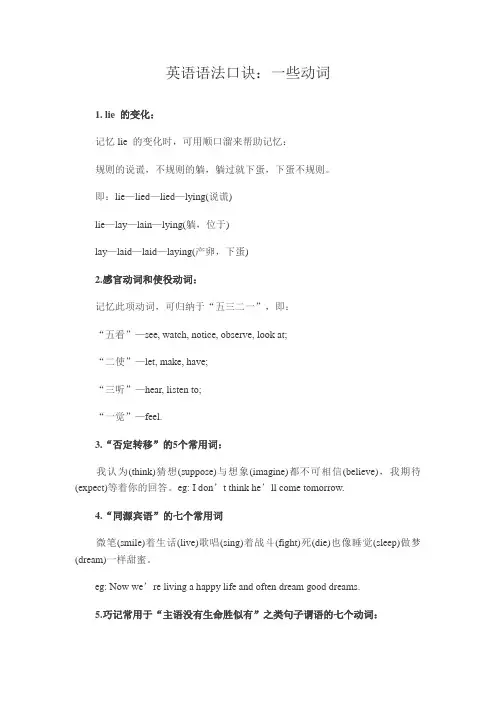
英语语法口诀:一些动词1. lie 的变化:记忆lie 的变化时,可用顺口溜来帮助记忆:规则的说谎,不规则的躺,躺过就下蛋,下蛋不规则。
即:lie—lied—lied—lying(说谎)lie—lay—lain—lying(躺,位于)lay—laid—laid—laying(产卵,下蛋)2.感官动词和使役动词:记忆此项动词,可归纳于“五三二一”,即:“五看”—see, watch, notice, observe, look at;“二使”—let, make, have;“三听”—hear, listen to;“一觉”—feel.3.“否定转移”的5个常用词:我认为(think)猜想(suppose)与想象(imagine)都不可相信(believe),我期待(expect)等着你的回答。
eg: I don’t think he’ll come tomorrow.4.“同源宾语”的七个常用词微笔(smile)着生话(live)歌唱(sing)着战斗(fight)死(die)也像睡觉(sleep)做梦(dream)一样甜蜜。
eg: Now we’re living a happy life and often dream good dreams.5.巧记常用于“主语没有生命胜似有”之类句子谓语的七个动词:如果看见(see)或发现(discover) Turn(音译:特恩),一定要找到(find)他,并带(bring)他到这儿给(give)大伙展示(show)一下。
eg: Tomorrow’ll see the opening of the meeting.Dusk found a little boy crying in the street.。
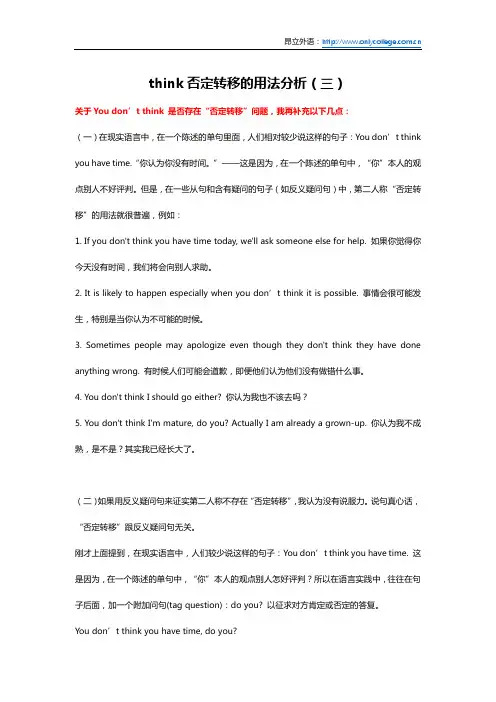
think否定转移的用法分析(三)关于You don’t think 是否存在“否定转移”问题,我再补充以下几点:(一)在现实语言中,在一个陈述的单句里面,人们相对较少说这样的句子:You don’t think you have time.“你认为你没有时间。
”——这是因为,在一个陈述的单句中,“你”本人的观点别人不好评判。
但是,在一些从句和含有疑问的句子(如反义疑问句)中,第二人称“否定转移”的用法就很普遍,例如:1. If you don't think you have time today, we'll ask someone else for help. 如果你觉得你今天没有时间,我们将会向别人求助。
2. It is likely to happen especially when you don’t think it is possible. 事情会很可能发生,特别是当你认为不可能的时候。
3. Sometimes people may apologize even though they don't think they have done anything wrong. 有时候人们可能会道歉,即便他们认为他们没有做错什么事。
4. You don't think I should go either? 你认为我也不该去吗?5. You don't think I'm mature, do you? Actually I am already a grown-up. 你认为我不成熟,是不是?其实我已经长大了。
(二)如果用反义疑问句来证实第二人称不存在“否定转移”,我认为没有说服力。
说句真心话,“否定转移”跟反义疑问句无关。
刚才上面提到,在现实语言中,人们较少说这样的句子:You don’t think you have time. 这是因为,在一个陈述的单句中,“你”本人的观点别人怎好评判?所以在语言实践中,往往在句子后面,加一个附加问句(tag question):do you? 以征求对方肯定或否定的答复。
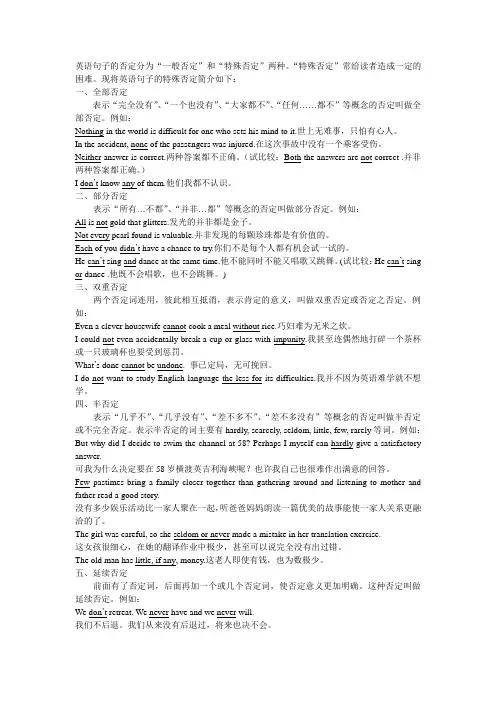
英语句子的否定分为“一般否定”和“特殊否定”两种。
“特殊否定”常给读者造成一定的困难。
现将英语句子的特殊否定简介如下:一、全部否定表示“完全没有”、“一个也没有”、“大家都不”、“任何……都不”等概念的否定叫做全部否定。
例如:Nothing in the world is difficult for one who sets his mind to it.世上无难事,只怕有心人。
In the accident, none of the passengers was injured.在这次事故中没有一个乘客受伤。
Neither answer is correct.两种答案都不正确。
(试比较:Both the answers are not correct .并非两种答案都正确。
)I don’t know any of them.他们我都不认识。
二、部分否定表示“所有…不都”、“并非…都”等概念的否定叫做部分否定。
例如:All is not gold that glitters.发光的并非都是金子。
Not every pearl found is valuable.并非发现的每颗珍珠都是有价值的。
Each of you didn’t have a chance to try.你们不是每个人都有机会试一试的。
He can’t sing and dance at the same time.他不能同时不能又唱歌又跳舞。
(试比较:He can’t sing or dance .他既不会唱歌,也不会跳舞。
)三、双重否定两个否定词连用,彼此相互抵消,表示肯定的意义,叫做双重否定或否定之否定。
例如:Even a clever housewife cannot cook a meal without rice.巧妇难为无米之炊。
I could not even accidentally break a cup or glass with impunity.我甚至连偶然地打碎一个茶杯或一只玻璃杯也要受到惩罚。

think否定转移的用法分析(三)关于You don’t think 是否存在“否定转移”问题,我再补充以下几点:(一)在现实语言中,在一个陈述的单句里面,人们相对较少说这样的句子:You don’t think you have time.“你认为你没有时间。
”——这是因为,在一个陈述的单句中,“你”本人的观点别人不好评判。
但是,在一些从句和含有疑问的句子(如反义疑问句)中,第二人称“否定转移”的用法就很普遍,例如:1. If you don't think you have time today, we'll ask someone else for help. 如果你觉得你今天没有时间,我们将会向别人求助。
2. It is likely to happen especially when you don’t think it is possible. 事情会很可能发生,特别是当你认为不可能的时候。
3. Sometimes people may apologize even though they don't think they have done anything wrong. 有时候人们可能会道歉,即便他们认为他们没有做错什么事。
4. You don't think I should go either? 你认为我也不该去吗?5. You don't think I'm mature, do you? Actually I am already a grown-up. 你认为我不成熟,是不是?其实我已经长大了。
(二)如果用反义疑问句来证实第二人称不存在“否定转移”,我认为没有说服力。
说句真心话,“否定转移”跟反义疑问句无关。
刚才上面提到,在现实语言中,人们较少说这样的句子:You don’t think you have time. 这是因为,在一个陈述的单句中,“你”本人的观点别人怎好评判?所以在语言实践中,往往在句子后面,加一个附加问句(tag question):do you? 以征求对方肯定或否定的答复。
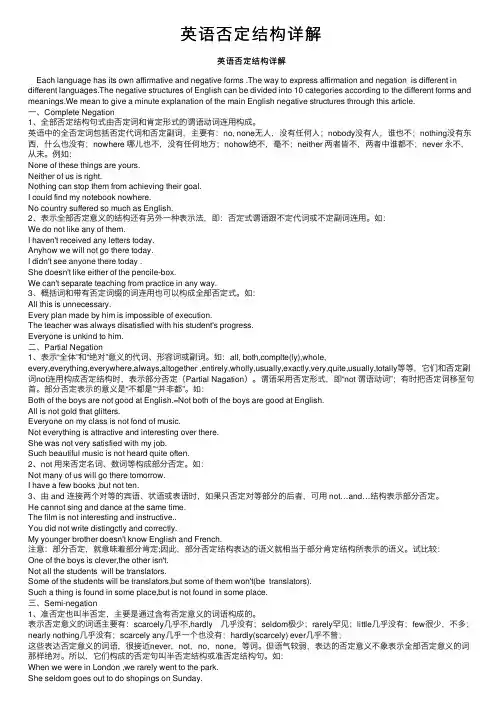
英语否定结构详解英语否定结构详解Each language has its own affirmative and negative forms .The way to express affirmation and negation is different in different languages.The negative structures of English can be divided into 10 categories according to the different forms and meanings.We mean to give a minute explanation of the main English negative structures through this article.⼀、Complete Negation1、全部否定结构句式由否定词和肯定形式的谓语动词连⽤构成。
英语中的全否定词包括否定代词和否定副词,主要有:no, none⽆⼈,没有任何⼈;nobody没有⼈,谁也不;nothing没有东西,什么也没有;nowhere 哪⼉也不,没有任何地⽅;nohow绝不,毫不;neither 两者皆不,两者中谁都不;never 永不,从未。
例如:None of these things are yours.Neither of us is right.Nothing can stop them from achieving their goal.I could find my notebook nowhere.No country suffered so much as English.2、表⽰全部否定意义的结构还有另外⼀种表⽰法,即:否定式谓语跟不定代词或不定副词连⽤。
如:We do not like any of them.I haven't received any letters today.Anyhow we will not go there today.I didn't see anyone there today .She doesn't like either of the pencile-box.We can't separate teaching from practice in any way.3、概括词和带有否定词缀的词连⽤也可以构成全部否定式。
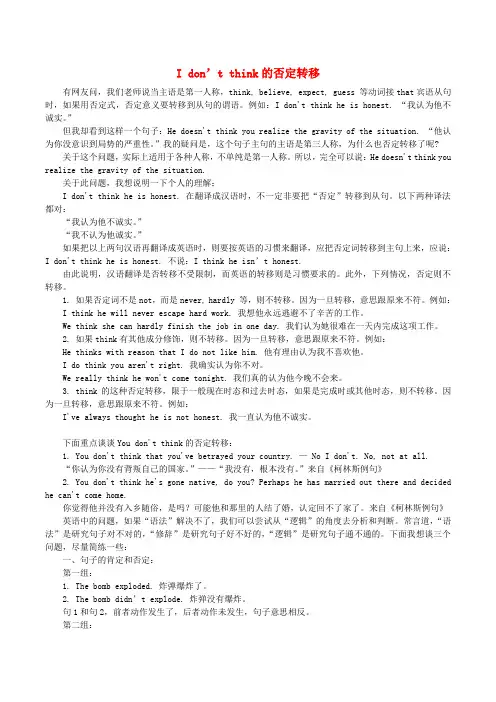
I don’t think的否定转移有网友问,我们老师说当主语是第一人称,think, believe, expect, guess 等动词接that宾语从句时,如果用否定式,否定意义要转移到从句的谓语。
例如:I don't think he is honest. “我认为他不诚实。
”但我却看到这样一个句子:He doesn't think you realize the gravity of the situation. “他认为你没意识到局势的严重性。
”我的疑问是,这个句子主句的主语是第三人称,为什么也否定转移了呢?关于这个问题,实际上适用于各种人称,不单纯是第一人称。
所以,完全可以说:He doesn't think you realize the gravity of the situation.关于此问题,我想说明一下个人的理解:I don't think he is honest. 在翻译成汉语时,不一定非要把“否定”转移到从句。
以下两种译法都对:“我认为他不诚实。
”“我不认为他诚实。
”如果把以上两句汉语再翻译成英语时,则要按英语的习惯来翻译,应把否定词转移到主句上来,应说:I don't think he is honest. 不说:I think he isn’t honest.由此说明,汉语翻译是否转移不受限制,而英语的转移则是习惯要求的。
此外,下列情况,否定则不转移。
1. 如果否定词不是not,而是never, hardly 等,则不转移。
因为一旦转移,意思跟原来不符。
例如:I think he will never escape hard work. 我想他永远逃避不了辛苦的工作。
We think she can hardly finish the job in one day. 我们认为她很难在一天内完成这项工作。
2. 如果think有其他成分修饰,则不转移。
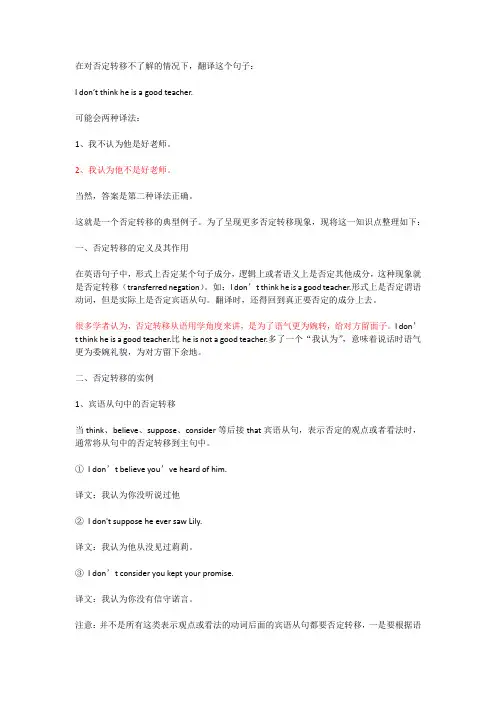
在对否定转移不了解的情况下,翻译这个句子:I don’t think he is a good teacher.可能会两种译法:1、我不认为他是好老师。
2、我认为他不是好老师。
当然,答案是第二种译法正确。
这就是一个否定转移的典型例子。
为了呈现更多否定转移现象,现将这一知识点整理如下:一、否定转移的定义及其作用在英语句子中,形式上否定某个句子成分,逻辑上或者语义上是否定其他成分,这种现象就是否定转移(transferred negation)。
如:I don’t think he is a good teacher.形式上是否定谓语动词,但是实际上是否定宾语从句。
翻译时,还得回到真正要否定的成分上去。
很多学者认为,否定转移从语用学角度来讲,是为了语气更为婉转,给对方留面子。
I don’t think he is a good teacher.比he is not a good teacher.多了一个“我认为”,意味着说话时语气更为委婉礼貌,为对方留下余地。
二、否定转移的实例1、宾语从句中的否定转移当think、believe、suppose、consider等后接that宾语从句,表示否定的观点或者看法时,通常将从句中的否定转移到主句中。
①I don’t believe you’ve heard of him.译文:我认为你没听说过他②I don't suppose he ever saw Lily.译文:我认为他从没见过莉莉。
③I don’t consider you kept your promise.译文:我认为你没有信守诺言。
注意:并不是所有这类表示观点或看法的动词后面的宾语从句都要否定转移,一是要根据语境和上下文理解;二是注意是否有情态动词,如有的话,否定不发生转移,如I can’t believe he is a good teacher. 我不能相信他是好老师。
三是当这类动词用过去时,表明说话人在讲话之前“没料到”、“没想到”,也不发生否定转移,此类句子的标志是使用了虚拟语气。
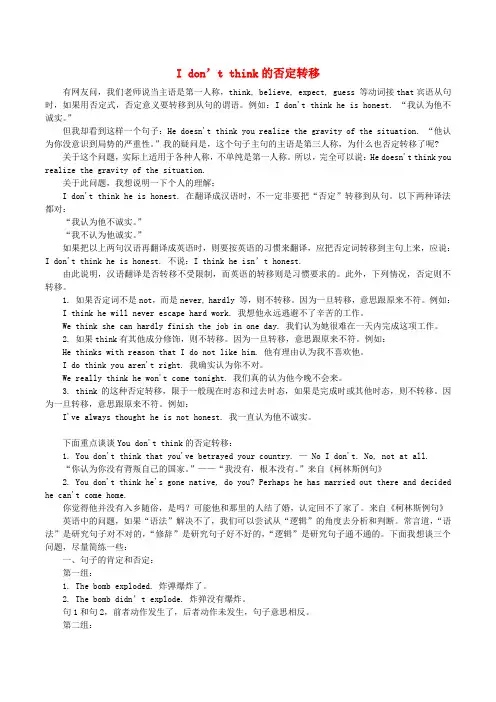
I don’t think的否定转移有网友问,我们老师说当主语是第一人称,think, believe, expect, guess 等动词接that宾语从句时,如果用否定式,否定意义要转移到从句的谓语。
例如:I don't think he is honest. “我认为他不诚实。
”但我却看到这样一个句子:He doesn't think you realize the gravity of the situation. “他认为你没意识到局势的严重性。
”我的疑问是,这个句子主句的主语是第三人称,为什么也否定转移了呢?关于这个问题,实际上适用于各种人称,不单纯是第一人称。
所以,完全可以说:He doesn't think you realize the gravity of the situation.关于此问题,我想说明一下个人的理解:I don't think he is honest. 在翻译成汉语时,不一定非要把“否定”转移到从句。
以下两种译法都对:“我认为他不诚实。
”“我不认为他诚实。
”如果把以上两句汉语再翻译成英语时,则要按英语的习惯来翻译,应把否定词转移到主句上来,应说:I don't think he is honest. 不说:I think he isn’t honest.由此说明,汉语翻译是否转移不受限制,而英语的转移则是习惯要求的。
此外,下列情况,否定则不转移。
1. 如果否定词不是not,而是never, hardly 等,则不转移。
因为一旦转移,意思跟原来不符。
例如:I think he will never escape hard work. 我想他永远逃避不了辛苦的工作。
We think she can hardly finish the job in one day. 我们认为她很难在一天内完成这项工作。
2. 如果think有其他成分修饰,则不转移。
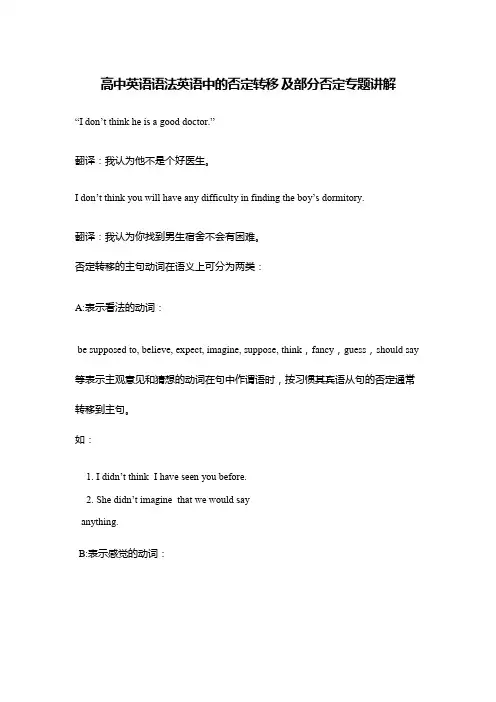
高中英语语法英语中的否定转移及部分否定专题讲解“I don’t think he is a good doctor.”翻译:我认为他不是个好医生。
I don’t think you will have any difficulty in finding the boy’s dormitory.翻译:我认为你找到男生宿舍不会有困难。
否定转移的主句动词在语义上可分为两类:A:表示看法的动词:be supposed to, believe, expect, imagine, suppose, think,fancy,guess,should say 等表示主观意见和猜想的动词在句中作谓语时,按习惯其宾语从句的否定通常转移到主句。
如:1. I didn’t think I have seen you before.2. She didn’t imagine that we would sayanything.B:表示感觉的动词:在seem,feel,taste,sound,appear,look like, feel as if, look as if, sound as if作联系动词的句子中,特别是seem,按习惯以它的否定来代替其他部分的否定。
例如:1. The baby doesn’t appear to be awake.2. It doesn’t look(看起来) like it’s(天不会)going to rain.3.English doesn't seem easy to learn. 英语好像不容易学。
4.It didn't seem during those years that there could be anyone else who might share my own peculiar tastes. 在那些年月里,似乎没有人会有我这样的特殊情趣。
类似的情况还有半助动词happen。
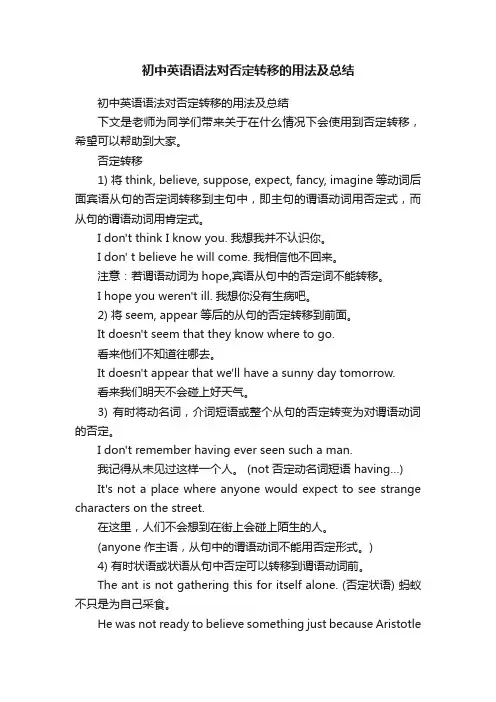
初中英语语法对否定转移的用法及总结初中英语语法对否定转移的用法及总结下文是老师为同学们带来关于在什么情况下会使用到否定转移,希望可以帮助到大家。
否定转移1) 将think, believe, suppose, expect, fancy, imagine等动词后面宾语从句的否定词转移到主句中,即主句的谓语动词用否定式,而从句的谓语动词用肯定式。
I don't think I know you. 我想我并不认识你。
I don' t believe he will come. 我相信他不回来。
注意:若谓语动词为hope,宾语从句中的否定词不能转移。
I hope you weren't ill. 我想你没有生病吧。
2) 将seem, appear 等后的从句的否定转移到前面。
It doesn't seem that they know where to go.看来他们不知道往哪去。
It doesn't appear that we'll have a sunny day tomorrow.看来我们明天不会碰上好天气。
3) 有时将动名词,介词短语或整个从句的否定转变为对谓语动词的否定。
I don't remember having ever seen such a man.我记得从未见过这样一个人。
(not否定动名词短语having…)It's not a place where anyone would expect to see strange characters on the street.在这里,人们不会想到在街上会碰上陌生的人。
(anyone 作主语,从句中的谓语动词不能用否定形式。
)4) 有时状语或状语从句中否定可以转移到谓语动词前。
The ant is not gathering this for itself alone. (否定状语) 蚂蚁不只是为自己采食。
“否定形式”一、显性否定1●,none,nobody,nothing,nowhere,neither,nor,neither...nor,but,without,unless,but for,but that,in the absence of,regardless of,instead of,exclusive of,short of,rather than,anything but,any more than,out of the question,would no more...than●由a-,dis-,il-,im-,ir-,un-,non-,anti-,mal-,under-等前缀及-less,-free,-proof 等后缀合成的否定词●hardly,scarcely,barely,little,few,seldom 等半否定词●avoid,ban,call off,cancel,deny,deprive,exclude,escape,evade,forbid,free...from,free from/of,fail,hate,ignore,lack,lose,miss,naught,neglect,prohibit,quit, refuse,rid,rule out,stop 以及above,against,beneath,beyond,far from,off,out of,past 和absent,bad,bare,empty,last,poor,vacant 等可用于表达否定概念的词。
这类否定句要注意如下三个问题:否定程度的强弱,说话者的态度以及否定句式表肯定概念1.He is not richer than I. 他不比我富。
2.He is no richer than I. 他和我一样,也不富。
3.He is not a statesman. 他不是政治家。
4.He is no statesman. 他绝非政治家。
否定转移的形式_否定句一、动词的否定转移1. 形式上否定主句的谓语,实际上是否定从句的谓语当动词think, believe, suppose, imagine, expect, feel的主语是第一人称、谓语动词为没有任何副词修饰的一般现在时,它们的否定式实际上是对宾语从句的否定。
表示说话者提出一种委婉的看法或主张。
如:I think that he will help us. I don’t think that he will help us. 我认为它不会帮助我们。
I believe that he is right. I don’t believe that he is right. 我认为他不对。
I suppose that he likes it. I don’t suppose that he likes it. 我想他不喜欢它。
2. 形式上否定谓语动词,实际上否定复合宾语当动词think, believe, suppose, imagine, expect, feel, find的主语是第一人称、谓语动词为没有任何副词修饰的一般现在时,它们前面的否定式实际上是对复合宾语的否定。
表示说话者所提出的一种委婉的看法或主张。
如:I think math difficult. I don’t think math difficult. 我认为数学不难。
I find the story interesting. I don’t find the story interesting. 我认为这个故事没有趣。
I expect so. I don’t expect so. 我认为不会。
注意:动词think, believe, suppose, imagine, expect, feel在下列情况下,否定不转移:(1) 这些动词跟其他另一个动词一起做并列谓语时,否定不转移。
如:I believe and hope he won’t do that. 我相信并且也希望他将不会那样做。
否定转移得用法1) 将think, believe, suppose, expect, fancy, imagine等动词后面宾语从句得否定词转移到主句中,即主句得谓语动词用否定式,而从句得谓语动词用肯定式、I don”t think I know you。
我想我并不认识您。
I don”t believe he will come。
我相信她不回来、注意:若谓语动词为hope,宾语从句中得否定词不能转移。
I hope you weren”t ill。
我想您没有生病吧。
2) 将seem, appear 等后得从句得否定转移到前面。
It doesn"tseem thatthey know where to go。
瞧来她们不知道往哪去。
It doesn”t appearthat we”ll have a sunny day tomorrow、瞧来我们明天不会碰上好天气。
3) 有时将动名词,介词短语或整个从句得否定转变为对谓语动词得否定。
I don”t remember having ever seen such a man。
我记得从未见过这样一个人。
(not否定动名词短语having…)It"s not a place where anyonewould expect to seestrange characterson the street。
在这里,人们不会想到在街上会碰上陌生得人。
(anyone 作主语,从句中得谓语动词不能用否定形式。
)否定转移用法总结Deep Rising Englishkenny128 (2006-03—1112:52)有感于课文中一句话得理解)山东高唐一中刘长友外研版得新课标英语课本第二册Module 1 “Zhou Kai(2)p2中有这样一句话:I think Idon’t get these things because I take a lot of exercise and am very fit、不少有学有基础得学生,其中包括一些老师,对这一个句子中,该不该用否定转移得句子,展开了激烈讨论。
校园英语 / 职业教育由not...because谈否定转移山西省大同卫生学校/张丽萍【Abstract】Transferred Negation is a form of language in learning English. There are some kinds of forms about it.【Key words】Transferred Negation; Form of Transferred Negation在英语教材中会遇见这样一个句子:Certainly I don’t teach because teaching is easy for me. 译:我当然不是因为教书对我很容易才教书的。
此句由课文内容可明显看出,其否定词not并不是否定主句谓语动词,而是转移到否定后面的原因状语从句。
因此不可译成“我当然不教书,因为教书对我很容易。
”这种语言现象被称之为Transferred Negation,即否定转移,是英语句法特有的表达习惯,在教学中会经常遇到,学生也易出错。
否定转移的形式有很多种。
下文就一些常见的形式探讨一下。
1.其中简单句的常见转移的形式有:(1)宾语的否定转移。
英语中在谓语动词之后的宾语多是名词短语,不定式等,否定宾语是往往把否定词放在谓语动词上。
例如:But you will not see all animals all through the winter.但是,在今冬你看到的不是所有动物。
(2)否定谓语转移为否定主语。
当句子主语为none of, nothing, 或由no修饰的主语时,谓语中的否定已转移在主语。
例如:Nothing in the world is difficult for one who sets his mind to it.天下无难事,只怕有心人。
(3)否定状语转移为否定谓语。
英语中在谓语动词后的状语多介词短语,不定式,副词等。
否定转移否定的转移是指英语否定句在句中某一部分(常在谓语部分),但在语义上却是否定另一部分的现象。
翻译这类句子时不要单纯依赖语法分析,而应从语义上分析,根据上下文理解句意。
例:He doesn’t teach because teaching is easy for him. 他之所以教书,并不是因为他觉得教书轻松。
一、否定形式在表示“看法”的谓语动词上,语义上却是否定后面的宾语从句。
此类动词有:think, believe, suppose, imagine, expect, anticipate, fancy, consider, find (感到), guess,be supposed to, calculate, figure, reckon。
- I don't believe I've met you before. ("I believe I haven’t met youbefore.") 我认为我没有见过你。
- I don't think you will be late. 我认为你不会迟到。
- I don't suppose he cares, does he? 我看他不在乎,对吧?- He doesn't expect we need worry. 他认为我们不必着急。
- I don’t recon she is old enough to go to school.我认为她还没到上学的年纪。
注:上述判断性动词出现以下情况时,其否定不发生转移:(1)用作插入语时:- Li Lei, I think, won’t be angry with you. 我想李蕾不会生你的气。
- Tom, I suppose, won’t be against it. 我猜想汤姆不会反对。
(2)这些动词跟其他另一个动词一起做并列谓语时:- I believe and hope he won’t do that. 我相信并且也希望他将不会那样做。
(3)用于疑问句时:- Do you think it is not going to rain? 你认为天不会下雨吗?(4)主句中添加情态动词can't, mustn't, wouldn't时:- You mustn’t think he’s stupid. 你不应该认为他愚蠢。
- I wouldn't have imagined that you would be here. 我不曾想到你会在这儿。
- I can’t imagine how he could survive that car accident.我想象不出在那次车祸中他是怎样活命的。
(5)think , expect 作料想讲时:- I didn’t expect I’d meet you here. 我没料到会在这里碰上你。
- We didn’t think he is such a selfish man. 我们没料到他是这样一个自私的人。
(6)suppose , think 用于祈使句式或被副词修饰时:- Don’t suppose you have passed the exam, this is only a part of the exam.别以为你通过了考试,这仅仅是考试的一部分。
- I simply don’t think you will give me a hand when I’m in difficulty.我根本不指望你在我困难的时候能帮助我。
- I really don’t think it’s necessary for us to go there now. 我的确不认为我们有必要去那儿。
- I feel strongly that he shouldn’t do such a thing. 我强烈地认为他不应该做那样的事。
(7)上述动词所接的宾语从句中如有all , every , many , both 等表全体意义的词或副词时:- I don’t believe both of them are innocent.我不相信他们两个都是清白的。
- I never expect all the students will do the exercises after classes.我从不抱希望于所有学生都会在课外做作业。
- We don’t consider everybody in our class is interested in this topic.我们并不认为班里的每个人都对这个话题感兴趣。
(8)由于cannot help, ought not,need not,not at all等短语的关系而把I think 隔离:- I should have thought sometimes you couldn’t help thinking of the past. 我应该想到你会禁不住想起过去。
- I think you ought not to walk at night alone, Mrs. Moore.- I think you need not be impolite to her,as well as to her son.- "I think the angel are not at al l in heaven." Mr.Esmond said."二、否定形式在表示“感觉”的谓语动词上,语义上却否定表语部分。
此类动词有:appear, seem, feel, sound, taste, smell, as if,feel / look / sound as if, feel / look like。
- The old streets don’t appear deserted.( not deserted . ) 老街看样子还没被废弃。
- I’m not feeling very well today. My head aches. ( not very well … )我今天感到不怎么舒服,头痛。
- The food doesn’t taste fresh. ( not fresh . ) 食物偿起来不鲜。
- It doesn’t seem that they know where to go. 看来他们不知道往哪去。
- It doesn’t appear that we’ll have a sunny day tomorrow. 看来我们明天不会碰上好天气。
三、seem, prove, happen 与不定式构成复合谓语,形式上否定谓语,语义上否定不定式。
- The president didn’t happen to attend that meeting.(happen not to attend … )董事长碰巧没参加那次会议。
- Your ans wer doesn’t seem to be right.(seem not to be …)你的答案看起来似乎不正确。
- Jack doens't seem to like you.(=Jack seems not to like you.)杰克看来不喜欢你。
- The news didn't seem to be true. 这个消息好象并不是真的。
四、pretend , remember 的宾语为非谓语动词时,形式上否定谓语,语义上否定宾语。
- My Italian friend didn’t pretend to see her tutor in the dining room. (pretend not to see … )我的意大利朋友在餐厅里假装没看见她导师。
- I couldn’t remember having carried my wallet out. (否定having …) 我记得不曾带钱包出门。
五、形式上否定谓语,语义上否定宾语补足语。
- I never knew him to carry money because he never had any use of it.我知道他身上从不带钱,因为他从不需要钱。
- We do not consider melting or boiling to be chemical change. (not to be … )我们认为熔化和沸腾不是化学反应。
- Seeing a ball flying, we don’t expect the ball to fly forever. (not to fly …)看到球飞时,我们认为它不会永远飞下去。
- I don’t think math difficult. 我认为数学不难。
- I don’t find the story interesting. 我认为这个故事没有趣。
- I don’t expect so. 我认为不会。
六、在“It is / was likely / probably + 从句”中,形式上否定谓语,语义上否定从句。
- It isn't likely that it will rain tomorrow. 看起来明天不会下雨。
- It isn't probable that he will come here today. 他今天也许不会来这里了。
七、形式上否定谓语,语义上否定状语或状语从句。
- He doesn't go to school by bus but on foot. 他不是步行去上学, 而是坐公共汽车。
- Don't judge a man by his appearance. 不要以貌取人。
- Don’t read in the sun. 不要在阳光下看书。
- Don’t talk with your mouth full of food. 不要口里含着食物说话。
- The ant is not gathering this for itself alone.蚂蚁不只是为自己采食。
- Let’s not talk about it here. 我们别在这里谈吧。
- This great victory has not been won easily.这个伟大的胜利赢来得并不容易。
- I did n't know his name until yesterday. (not ... until)我直到昨天才知道他的名字。